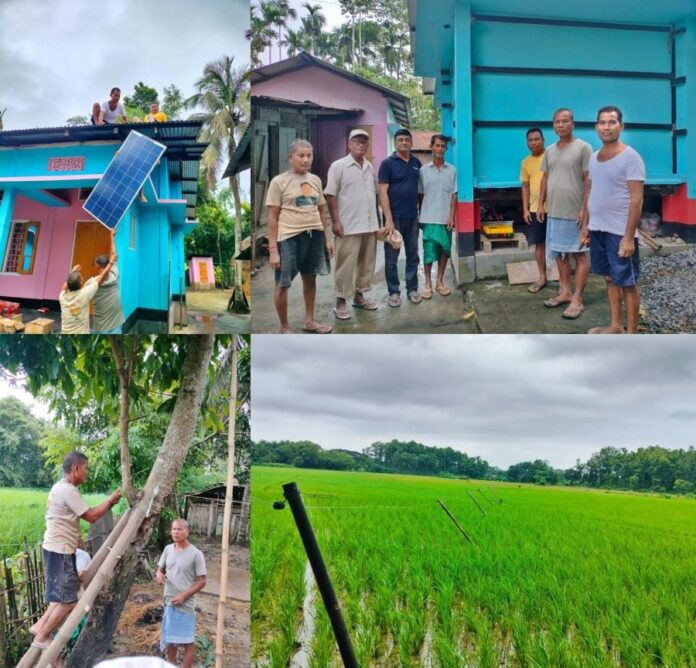In the Kaliabor region of Assam, farmers are grappling with a dire situation as a solar-powered tubewell remains nonfunctional for over a year. Located in the Borbhagiya field, this crucial irrigation system has left nearly ten hectares of agricultural land parched and unproductive. The inability to access water for irrigation has led to severe losses for farmers who rely on their paddy fields for sustenance and income. The plight of these farmers illustrates the growing challenges in agricultural management, especially when it comes to technology intended to ease their burdens.
Farmers had high hopes when the solar-powered tubewell was installed. It represented a modern solution to a long-standing problem of water scarcity during critical growing periods. However, as days turned into months without functioning equipment, the reality of their situation began to set in. With the tubewell inoperative, farmers cannot irrigate their fields, and the paddy crops have begun to wither under the scorching sun. Reports indicate that many families are now staring at crop failure, leading to significant economic strain.
The situation has prompted the local farming community to express their frustrations regarding the lack of support and maintenance. Farmers have reached out to local authorities, seeking urgent action to restore the tubewell. They emphasize that the responsibility for ensuring the functionality of such installations should fall on the government and the organizations that implemented these solar systems. Yet, as the seasons change and rainfall becomes unpredictable, their pleas have often gone unanswered, leaving them feeling abandoned and hopeless.
The economic implications of this irrigation failure extend beyond individual farmers. The agricultural sector in Assam plays a vital role in the state’s economy, and significant crop failures can affect food supply chains, market prices, and ultimately, the livelihoods of countless families. Many farmers report they are now forced to seek alternative employment, often resulting in long days in less secure work to compensate for the loss of income from their fields. This added pressure can lead to mental health struggles and a sense of instability in communities that have traditionally relied on agriculture as their primary source of income.
In addition to financial losses, the emotional toll on farmers is immense. Many have invested years of hard work into cultivating their fields, and the prospect of losing everything they’ve built up can be overwhelming. This struggle has also sparked discussions among the community about the need for diversification. Some farmers consider shifting to more resilient crops that require less water or exploring other agricultural practices that do not depend heavily on irrigation. However, these transitions can be daunting, particularly for those who have always farmed rice.
Experts suggest that this situation highlights the urgent need for better infrastructure and maintenance protocols for solar-powered irrigation systems. While solar technology has the potential to revolutionize farming in remote areas, it requires a reliable framework to ensure sustainability. There is a pressing need for training programs that educate farmers on the proper care and management of these systems, coupled with a responsive maintenance service that can address issues promptly.
Community leaders have begun advocating for more governmental attention toward agricultural infrastructure, particularly in areas like Kaliabor where dependence on such systems is high. They argue that investments in local irrigation projects and maintenance support will empower farmers and ultimately enhance food security in the region. Building resilience in farming practices becomes critical as climate change continues to alter weather patterns and affect crop yields.
As the farmers of Kaliabor face an uncertain future, their resilience and determination shine through. They continue to advocate for their rights, pushing for solutions that will restore their livelihoods. Community support and awareness campaigns aim to draw attention to their plight, hoping that with enough pressure, the relevant authorities will take action. The story of the solar-powered tubewell in Borbhagiya serves as a reminder of the importance of sustainable agricultural practices and the commitment needed to support the farmers who feed the nation.




